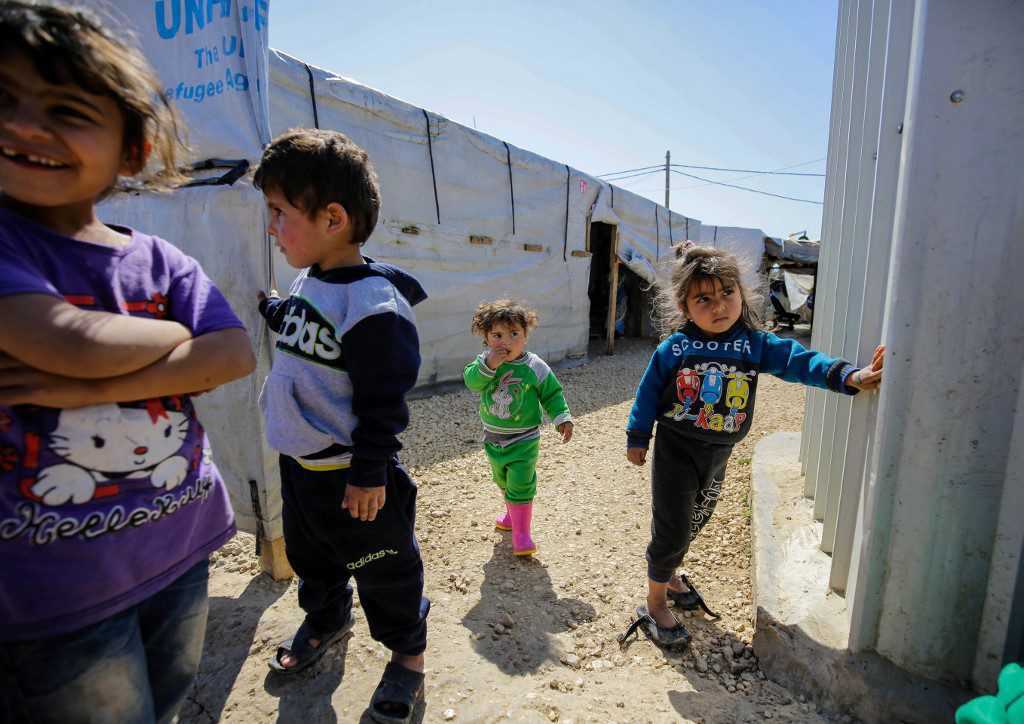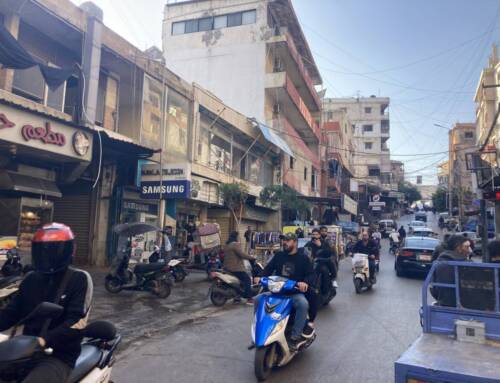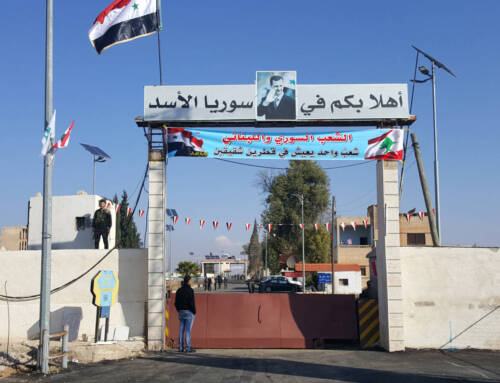Syrians born in Lebanon at risk of falling in legal limbo
Unregistered children can end up in legal limbo hindering their access to health or education services in Lebanon
5 July 2020
Syrian children are pictured at a refugee camp in the village of Mhammara in the northern Lebanese Akkar region, 9/3/2019 (AFP)
BEIRUT – Since the start of the Syrian uprising in 2011 that turned into a civil war, more than 188,000 children of Syrian refugee parents have been born on Lebanese soil, but in 2019 only 30 percent of newborns were registered with the Lebanese authorities. This figure, although low, reflects a positive trend from 2017 and 2018, 17 and 21 percent respectively, according to UNHCR data. Unregistered children can end up in legal limbo and have difficulties accessing basic services in Lebanon.
For instance, some schools arbitrarily ask displaced Syrian families for additional documents beyond those required by the Ministry of Education and refuse to enroll children lacking those papers. “The lack of civil documentation shouldn’t be a reason to refuse a child to enroll, but rather to refer the family to a legal actor to make sure they can get the necessary documents,” Elena Dikomitis, Advocacy Adviser at the Norwegian Refugee Council (NRC) in Lebanon told Syria Direct.
Unregistered children can be prevented from traveling, and thus, returning to Syria. “If people return to Syria and their civil documentation on the Lebanese side of the border has not been finalized, it will be challenging to update their family records inside Syria,” warned Dikomitis. Once in Syria, these children face obstacles in terms of access to education or humanitarian aid, as well as inheritance or property rights.
The obstacle race
In Lebanon, if Syrian refugees don’t register their newborn within one year, they have to go through a costly legal process to do so later. In March 2018, since many families had exceeded the one-year deadline, the government allowed children born between January 2011 and February 2018 to be registered at no extra cost. This resulted in 50,000 birth registrations.
In 2019, another ‘one-year waiver’ was passed for those born after February 2018, but to date, no decision has been announced for those born after February 2019. “If this waiver is not extended, this could have a serious impact on birth registrations for children born after February 2019, because then it would require a civil court procedure, which makes it much more challenging for people to register the birth,” said Lianna Badamo, Information, Counselling and Legal Assistance specialist at NRC Lebanon. Badamo also warned that there could be a “backlog” in birth registration this year due to the Covid-19 related office closures.
The first step to registering a baby is to obtain the birth notification at the hospital. Syrian refugees in Lebanon have access to subsidized health care for which they are required to pay a ‘patient share’, that is, a part of the medical bill. When hospital care becomes expensive, for example in the case of intensive care of a new-born baby, the patient share is, as a consequence, higher. When the family cannot afford this extra cost, the NRC has documented cases where some hospitals unlawfully confiscate documents (the ID of the parents or the birth notification) or even ‘retain’ newborns, that is, they don’t allow the family to take the child home until they cover the costs.
Among Syrian refugees in Lebanon, 95 percent of births last year took place in a hospital, while only four percent gave birth at home, according to UN data. When an uncertified midwife delivers the baby, she cannot provide the birth notification, thus, the family faces further problems in trying to officially register the birth.
Once the family has the ‘birth notification’, they need to get the ‘birth certificate’ issued by the local mukhtar (elected official). NRC has identified a tendency on the side of the mukhtar to increase the fees in the midst of the current economic crisis. Later on, the birth has to be registered at the Registry Office, the Registry Office for Foreigners, the Ministry of Foreign Affairs and, finally, the Syrian Embassy.
These visits to government bodies are a challenge for many, not only due to transportation costs but also because of fear of being arbitrarily detained at a checkpoint. Only 22 percent of Syrian refugees have legal residency in Lebanon, thus many are reluctant to approach administrative authorities, especially after the decision by the Higher Defense Council to deport Syrians that entered Lebanon illegally after April 2019. “If I cross a checkpoint or approach an administrative authority and can’t prove with a stamp or a document that I was already in Lebanon before April 24, 2019, I am at risk of being detained, arrested or deported,” said Dikomitis.
Those without legal residency can register the birth, but they need to show proof of marriage. According to UNHCR, 27 percent of displaced Syrians do not have legal marriage documentation; to obtain proof of marriage at least one of the spouses has to have legal residency.
By the Syrian Citizenship Law, nationality is given to anyone born outside the country with a Syrian father or a Syrian Arab mother whose attribution to his father has not been legally established. However, if the child is born in Lebanon, first it has to be registered at the Foreigners’ Registry in Lebanon, and that is an ordeal.







